Make a Plan
Documenting Goals and Treatment Priorities
For adults with chronic illness or those seeking to give more specific information about their values and health care preferences.
In addition to appointing a health care agent, you can provide detailed information about what matters most to you in the event of a health crisis, serious illness or injury. Completing an advance directive with treatment preferences will help guide your health care agent(s), family, friends and care providers at a time of critical illness or injury.
Sharing What Matters Most
Often, decisions about the right course of treatment are straightforward and easy to make. But, many decisions are not so easy. Sometimes there are several options, each with different potential risks and benefits, but none is clearly “best.” In these cases, the right course of treatment is the one that is right for you, taking into account your personal goals and priorities.
You can provide general information about:
- Your personal health care goals
- Important religious, faith or spiritual considerations
- Situations in which invasive treatment(s) would or would not be acceptable
- Preferences for palliative and hospice care if you become seriously ill or are dying
- Views on organ and tissue donation
- Funeral and burial arrangements
You can also provide specific information about:
- Cardiopulmonary resuscitation (CPR)
- Breathing machines (ventilators)
- The use of artificial foods and fluids (feeding tubes)
- Time limited trials of treatment to see if you will get better
- Mental health or psychiatric considerations
- Dementia/Alzheimer’s specific considerations
Completing Your Advance Directive
For your form to be legally recognized in Vermont, you must sign in the presence of two witnesses. Once completed:
- Give copies to your agent, your health care provider, your local hospital, and any friends/family you wish.
- Send your document to the Vermont Advance Directive Registry where it can be accessed when needed.
Remember:
You can change your mind at any time. Just update your document by completing a new form and give the new signed and witnessed copies to your agent, your health care provider, your local hospital, and any friends/family you wish. If your document is registered with the Vermont Advance Directive Registry, you should also send a new copy to them with a VADR Administrative Form.
